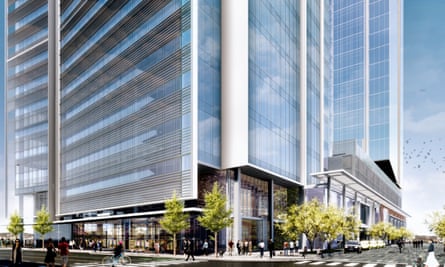Nashville has a way of bringing people together – usually through music. This time it’s through a shared antipathy for the $100m-plus in subsidies this booming city has just handed to Amazon, the world’s most valuable retailer.
The ink has barely dried on a deal that the state of Tennessee and the city awarded Amazon and there are now only a few small hurdles remaining before Amazon starts moving in to a downtown office complex planned for Nashville Yards.
But an unusual alliance of free-market libertarians and union-backed activists is determined to hold the politicians and executives responsible for the deal to account. Their hope is that it will serve as a warning to others looking to hand public money to profitable companies in return for the promise of new jobs.
“This is one area where libertarians and socialists can agree on something: this is a bad idea,” said John Mozena, president of the Center for Economic Accountability, a free market advocacy group and a self described libertarian.
Local activist Odessa Kelly agrees. A parks and recreations employee and member of the union-backed Stand Up Nashville coalition she says the deal is symptomatic of an approach that is failing the city while handing millions to a company that doesn’t need it.

“We are being moved around like pawns on a chess board for the rich,” she says. “I hate to say it but we have become a playground for the rich.”
It wasn’t supposed to be this way. Last November Amazon announced that the capital of country music was one of its chosen cities, following a long search to build “HQ2” – a second base away from its Seattle headquarters. States and cities across the US had fought hard in a sometimes bizarre beauty pageant to win the prize. Arizona offered Amazon a giant cactus to seal the deal.
In the end HQ2 was split between Queens in New York and Virginia’s Arlington County. Nashville picked up the consolation prize and a promise of 5,000 high-paying jobs.
For all the political schmoozing and promises of a “prime” future, being part of HQ2 has proven problematic. The backlash from residents and politicians in New York was so fierce that Amazon canceled its plans. Politicians in Virginia too have felt the heat from locals who worry about the impact of gentrification.
The fight in Nashville is far from over. Following pressure from Stand up Nashville and others, Amazon (and any other corporation receiving taxpayer funds) will have to publish accounts to prove it is living up to its promise to deliver high-paid jobs to locals. Amazon is not be the first company to promise big benefits in return for subsidies, but few will be as closely watched in the years ahead.

Kelly is worried about the impact of the company on a city that has already been transformed by a rush of investment. “We are being pushed out to the fringes of the city,” she said. “There is no more working class in the city of Nashville. We do middle class work but we can’t afford middle class lives.”
After the New York deal imploded Holly Sullivan, head of Amazon’s economic development team worldwide, told The Tennessean residents had nothing to fear.
“Community engagement is something that is, quite frankly, in our DNA,” Sullivan said. “You are never going to locate in a community or neighborhood that you are going to have 100% support and, oftentimes, the most vocal are those against something. But, it’s also an education opportunity for us to learn, ‘what are their priorities?’ They might, actually, once they get to know us, realize that we might be aligned on some of those priorities.”
Amazon has promised to create over 5,000 jobs paying an average of over $150,000 in the city. Given the median US household income is $61,372, it is little wonder politicians were so eager for its business.
But for Mozena those numbers hide a bigger issue: Amazon doesn’t need the money and the city can’t afford it. Plenty of other cities offered “way more money” than Nashville, said Mozena. “In fact, Amazon just announced they were adding hundreds of jobs in Austin, Texas and didn’t ask for money because they just wanted the workforce in Austin that much.”
When Amazon announced the hunt for HQ2 it said that while incentives played a role, the primary issue was workforce. Nashville, like Austin, has that workforce.
“That’s the way jobs and the economy are moving,” said Mozena. “It’s not the old model that a city or state lures in a factory and then people move to where the jobs are. These companies are so much more dependent on knowledge, on skilled labour, that they are going to where the people are. That’s the mistake cities are still making. They are acting like Amazon is a car factory in the 1950s.”

The academic research suggests Mozena is right. A 2018 study by Timothy Bartik, an economist who specializes in regional economics at the W E Upjohn Institute for Employment Research in Kalamazoo, Michigan, found 75% of companies would have moved to a city or state even without incentives.
Politically, however, polling shows that the all-important swing voter is won over by announcements of new jobs, he said. At least for now.
Anne Barnett, co-chair of Stand Up Nashville, said she had had many discussions with police officers, firefighters and others recently who, while “on the other end of the political spectrum”, were dubious about the deal too. “There are a growing number of folks who are very critical of these incentives,” she said. “It’s a moral issue.”
The impact of the deal is already being felt in Nashville, where rents are rising. Barnett said residents were worried about the future of North Nashville, a historically African American neighborhood that has so far escaped the full force of gentrification, which has hit many other areas of the city.
“This money isn’t free,” said Mozena. “It is money that can be used for roads, police officer and schools, investments that can significantly improve the quality of life for communities. You are taking money away from investments that can make your community a good place to live and attractive to companies in the long term.”
And that, he says, is “something that the principled left and the principled right” can agree on.
Follow Guardian Cities on Twitter, Facebook and Instagram to join the discussion, catch up on our best stories or sign up for our weekly newsletter
